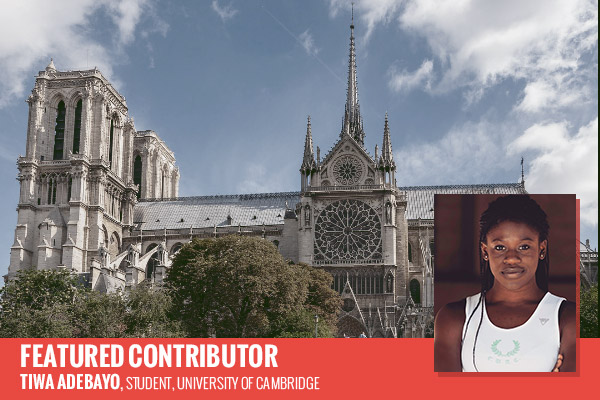
What Does the Outpouring of Grief Over Notre Dame Say About Our Relationship with Religion?
- By Tiwa Adebayo --
- 17 Apr 2019 --

Modern day Europe has been described as a “post-Christian society.” So why did we have a meltdown at the sight of Notre Dame Cathedral burning?
The evening of April 15 was a historic moment in which the world was united in both grief and utter disbelief. As Notre Dame Cathedral, one of the world’s most iconic places of worship, collapsed in flames, the sense of despair was palpable. Young and old, French and foreigners, all looked on with intense feelings of loss and powerlessness to stop the terrible tragedy unfolding before them.
What Does the Outpouring of Grief Over Notre Dame Say About Our Relationship with Religion?[/tweetthis]
There was something almost apocalyptic about watching the once majestic Cathedral nearly reduced to rubble. I will never forget the image of the two highest spires, ablaze in red, tumbling to the ground. Seeing one of the greatest monuments to culture that mankind has ever produced destroyed in a matter of seconds was a sharp reminder of the transient nature of humanity.
It often takes events of this magnitude to remind us of our humanity. In the midst of disaster, people could literally do nothing but pray. Mankind for all its arrogance was forced, albeit momentarily, to seek God.
Increasingly, in Western society, we are encouraged to pursue ration instead of religion. Although the two are not necessarily opposed, they are often presented as such. With the scientific advancements of the 21st century, it seems that God is no longer needed.
Sociologists have been arguing that religion is in terminal decline since the 20th century. The more industrialised and wealthy a society becomes, the less they rely upon religion. Although this phenomenon, known as secularization thesis, has been widely disproved in the global south, it seems to be an accurate description of affairs in Western Europe. A 2010 survey showed 40% of the French population reported having absolutely no belief in any sort of spirit, God, or life force, making the events of Monday evening all the more extraordinary.
The French, at least in public life, are famously anti-religion. Secularism in public institutions, or laïcité as it’s known, is enshrined in the constitution and taken so seriously that there was even uproar over Halal meals being served in public schools. The separation between church and state is as much a part of the French national identity as Notre Dame itself.
For years, furious debate and legislation against public expressions of religion have dominated the French press and yet, faced with a symbol of their national identity tumbling around them, hundreds of French people banded together in an extraordinary outpouring of belief. French citizens of all ages, races and creeds descended on the cathedral with hands joined in solidarity, united in a rendition of Ave Maria. Some even knelt in prayer.
Crowds Sing #AveMaria ? Outside of the Burning #NotreDameCathedral in #Paris ??
https://t.co/bu6CSshW77— Honored Valor® (@HonoredValor) April 16, 2019
That this powerfully religious display was the knee jerk reaction of those witnessing the disarray is incredibly telling. In our darkest hours it is comforting to believe there is something bigger than us controlling it all. Though we often try to reject him, chaos forces us to reach for God.
In our so called secular society, we must question why our reaction to a cathedral burning was just so violent. Whilst it is always unfortunate when a piece of history is destroyed, it is clear the reaction to Notre Dame’s destruction is unprecedented. Damage to similar historical buildings such as those of Windsor castle in 1992 and the ancient city of Palmyra in 2015 have not motivated the same level of global mourning nor have they inspired donors to give over one billion euros in just two days.
Perhaps the reason so many of us felt such intense feelings at the fall of Notre Dame is because it represents God’s position in our lives. Like Notre Dame, we might take God for granted or even ignore him most of the time, but it’s comforting to know he’s there. Losing Notre Dame, a constant for more than 800 years, felt almost like losing God and that’s why it was so painful.
Notre Dame was seldom used by its many admirers for religious practice. Although it was a functioning cathedral which provided services, the vast majority of its visitors flocked to see its beauty and architectural majesty. Those who built the cathedral no doubt wanted others to admire its beauty and yet also be reminded that its structural magnificence pales in comparison to the one who inspired it.
Whether or not these visitors believed in God is irrelevant. They visited a beautiful building constructed to glorify God and felt reverence. The events of the last two days have shown that although mankind might be losing interest in religion, it has not entirely lost that reverence to God.


















